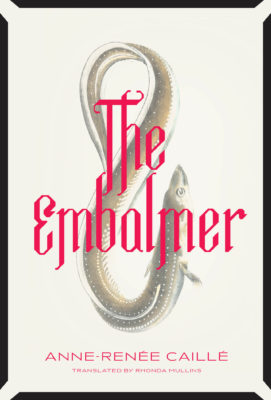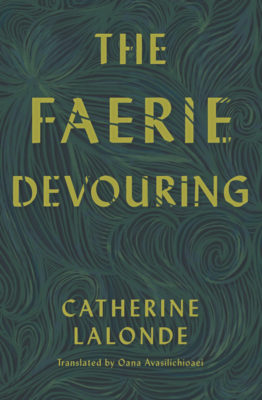“This is not an investigation,” proclaims the narrator of Anne-Renée Caillé’s The Embalmer, as she leads the reader into a series of conversations with her father, the titular undertaker. “I am not studying him,” she continues, and yet, throughout the text, she conducts an in-depth inquiry into his work of making the dead presentable. She asks him to share his recollections of the bodies he’s embalmed, what he knows of the people they were. The tone is at once investigative and poetic – the father’s notes on each job contain hints about his own emotional relationship to his work and family. He speaks matter-of-factly about suicides, accidents, murders, and then of the physical realities of the trade: he once considered breaking the tensed up arms of a body in order to fit it into its casket.

The Embalmer
Anne-Renée Caillé
Translated by Rhonda Mullins
Coach House Books
$17.95
paper
96pp
9781552453780
Catherine Lalonde’s The Faerie Devouring likewise centres on an intimate familial relationship: the sprite, a young girl, is raised by her staunch grandmother among a gaggle of other children in rural Quebec. In contrast with the precise, crystalline images and mood of The Embalmer, Lalonde’s language is organic, pulsing, and repetitive in the way of fairy tales. The Faerie Devouring is a loose, impressionistic text that captures the fraught, shifting relationship between the sprite and her Gramma. Lalonde’s characters are physical before anything else, moving constantly but barely speaking.

The Faerie Devouring
Catherine Lalonde
Translated by Oana Avasilichioaei
Book*hug
$20.00
paper
136pp
9781771664271
The dead of The Embalmer deliver an emotional clout that is not quite so well achieved in The Faerie Devouring, which suffers some pacing issues. A middle section of the book, in which the sprite leaves her childhood home and her Gramma to discover herself in the big city, is strangely brief. Too quickly, after a handful of pages of urban delight, she’s an adult visiting her childhood home. We don’t feel the impact of the time that’s passed, nor the significance of her return. Like the narrator of The Embalmer, the grown-up sprite closely observes her grandmother, sensing the fragility beneath the stoic exterior: “There’s a risk that she who’s held herself up for so long with tough talk, tense body and no gentleness might crack.” The outcome of this new knowing is surprising, but there is an overall lack of momentum in the book, which diminishes the intensity of its final scenes. The slow, steady pacing of The Embalmer, and its inevitable build-up of bodies and stories, on the other hand, leads to an emotionally impactful conclusion, stark and brief as the rest of the text, but no less powerful for that. mRb






0 Comments